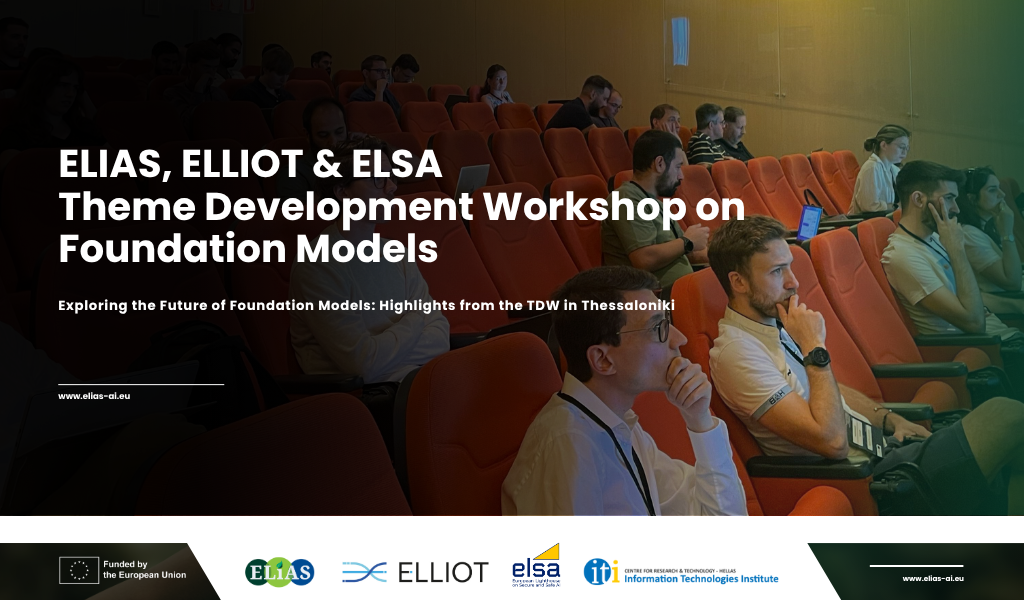
Protected: Exploring the Future of Foundation Models: Key Insights from the TDW on Foundation Models
Password Protected
To view this protected post, enter the password below:

To view this protected post, enter the password below:

To view this protected post, enter the password below:
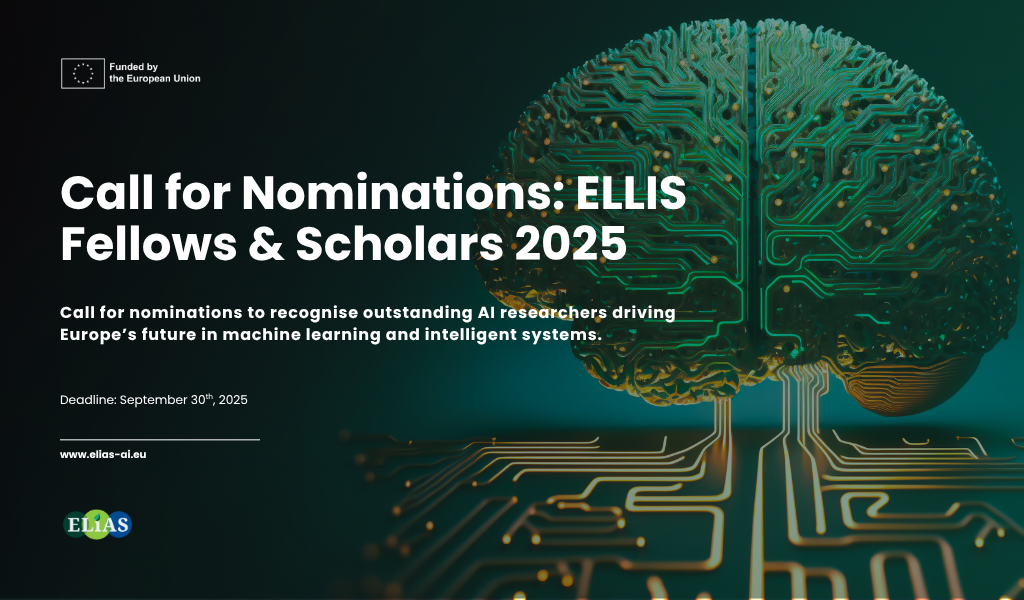
The European Laboratory for Learning and Intelligent Systems (ELLIS) is accepting nominations for new Fellows and Scholars.
Inspired by the Canadian CIFAR network (formerly LMB CIFAR), the ELLIS Fellowship Program brings together outstanding researchers through collaborative groups that focus on key research themes via workshops and ongoing collaboration.
This initiative serves two key purposes:
ELLIS Fellows are outstanding senior researchers—typically with more than ten years of post-PhD experience—who play a key role in shaping the scientific and strategic vision of ELLIS. They act as ambassadors, provide leadership, and actively contribute to strengthening the ELLIS ecosystem.
ELLIS Scholars are exceptional early-career researchers—often assistant professors—with up to ten years of post-PhD experience, who are clearly on a trajectory towards becoming future Fellows.
For ease of reference, the term “Fellow” is used below to encompass both Fellows and Scholars.
Key Contributions of Fellows
Beyond research excellence and community-building, ELLIS Fellows contribute to the network in several key ways:
Fellowship Programs unite researchers through regular meetings held across Europe, encouraging the exchange of ideas, strengthening community ties, and enhancing the international visibility of European AI research.
These programs are currently supported by the ELIAS project, with fellowships guaranteed until the end of ELIAS funding (2027).
Only ELLIS Program and Unit Directors are eligible to nominate candidates for Fellowship.
Detailed guidelines on the evaluation criteria were recently updated and can be found here → .
Interested researchers should reach out directly to the relevant Director.
🗓️ Deadline for nominations: September 30th, 2025
More details and the full nomination guidelines are available at:🔗 Open Call for ELLIS Fellows and Scholar nominations 2025
View last year’s call and selected Fellows & Scholars: 🔗 Fellows & Scholar
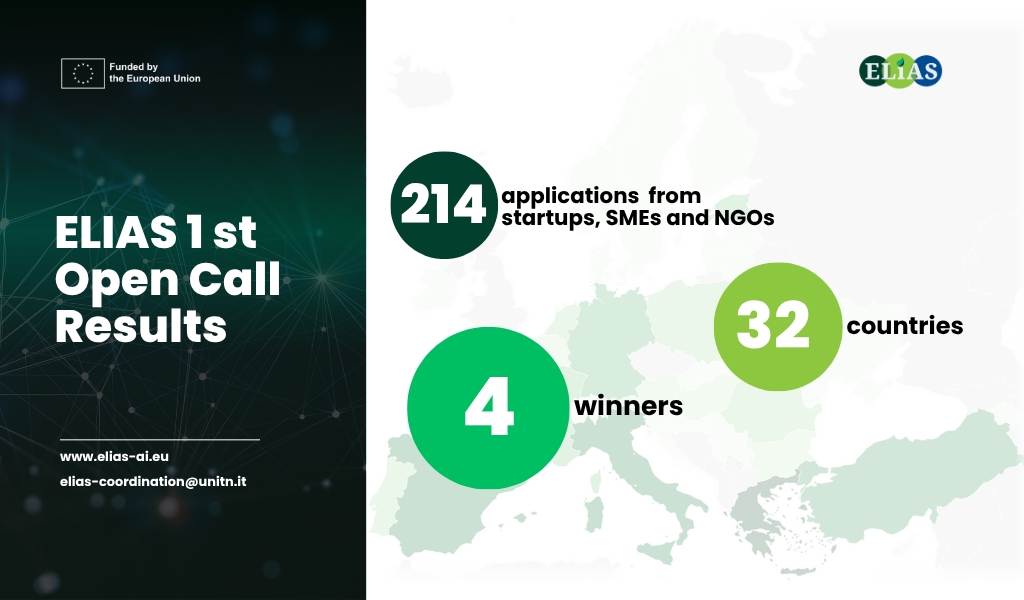
Bringing Cutting-Edge AI Innovations to Sustainability Challenges
Trento, Italy – June 20th, 2025
The European Lighthouse of AI for Sustainability (ELIAS) is excited to announce the selection of four visionary projects as winners of its 1st Open Call for AI-driven sustainability projects. These cutting-edge initiatives will receive funding and support to develop AI-driven solutions addressing some of today’s most urgent environmental and societal challenges.
This milestone marks a major step forward in ELIAS’s commitment to harnessing artificial intelligence to drive sustainable innovation and societal impact.
The call attracted remarkable interest, with 214 submissions from startups, SMEs, and NGOs across 32 countries, highlighting the vibrant European and global AI innovation ecosystem committed to tackling pressing societal and environmental challenges. Proposals addressed seven targeted use cases (UCs), including AI for Building Optimisation (53 proposals), AI for Monitoring Virtual Infrastructure (24), Responsible User-centric Advertising (22), Mitigating Misinformed Migrant Perception in the EU (15), AI for Forecasting Vegetation State (42), Materials Discovery (13), and Personalised Co-piloting Systems (44), alongside 42 proposals covering other relevant topics.
Each selected project will enter a six-month development programme, receiving up to €60,000 in funding, and visibility through ELIAS channels and events.

Projects were assessed by the consortium members and by 2 independent experts on three key criteria:
Tie-breakers considered diversity, environmental and social impact, and submission timing. Only the highest-scoring projects progressed to the final selection.
“The response to our first Open Call exceeded all expectations, showing just how vibrant and mission-driven the European AI ecosystem is. These four selected projects demonstrate the transformative power of AI when applied with purpose and responsibility,” said Prof. Nicu Sebe, Coordinator of ELIAS.
by EWALA IT Services (SPAIN)
LUCIA is an open-source, AI-powered platform that optimises energy use in smart buildings. Lightweight and privacy-preserving, it deploys self-learning agents across systems such as HVAC, lighting, and energy metering to detect inefficiencies, adapt in real time, and reduce costs and emissions. These edge-based agents, coordinated by a central server, enable scalable, automated control while preserving data sovereignty. Fully aligned with GAIA-X and ELIAS principles, LUCIA directly addresses UC1 – AI for Building Optimisation, offering a secure, sustainable solution for both public and private infrastructure.
by Valence Technologies (BELGIUM)
PINNSSHS advances the design of self-healing polymers using a reverse-engineering approach powered by physics-informed neural networks (PINNs). Starting from target mechanical properties like Young’s modulus and viscosity, it identifies optimal chemical formulations, validated further through chemical kinetics simulations to ensure fast, cost-effective curing. This intelligent pipeline accelerates polymer development by up to six months and supports sustainable innovation aligned with the EU Green Deal and Circular Economy Action Plan, directly addressing UC6 – Materials Discovery.
by Multiverse Computing SL (SPAIN)
TENSORIA combines the precision of autoencoders with the interpretability of tensor networks to deliver a lightweight, transparent, and energy-efficient AI for real-time cybersecurity monitoring of virtual infrastructures (UC2 – AI for Monitoring Virtual Infrastructure). By improving transparency and interpretability, TENSORIA enhances decision-making and accelerates response times while maintaining performance on par with existing AI methods, addressing the common challenge of “black box” models in cybersecurity.
by Athens Technology Center (Greece)
AI-REFRAME uses deep learning and large language models to detect and counter disinformation about migration. Designed for all user levels—journalists, policymakers, educators, and the public—it provides interpretable insights and reliable counternarratives to foster informed, inclusive dialogue (UC 4 – Mitigating Misinformed Migrant Perception in the EU). The project supports media literacy, promotes critical thinking, and aids policymakers in crafting more targeted and culturally sensitive policies, contributing to human rights and sustainable development goals.
These winning projects exemplify ELIAS’s vision of AI as a powerful driver of sustainable development, ethical innovation, and societal well-being. By supporting mission-driven AI initiatives, ELIAS continues to strengthen Europe’s position as a global leader in responsible AI research and application.
“The diversity and real-world impact of these projects are impressive. It’s inspiring to see so many innovative SMEs, NGOs, and startups contributing to our vision, showcasing the strength of AI innovation across Europe. We look forward to discovering even more groundbreaking solutions in our second Call opening early 2026,” said Cecilia Zanazzo, Project Manager of ELIAS.
Building on the success of its first Open Call, ELIAS is set to accelerate cross-sector collaboration and innovation to create a greener, fairer future. The second Call for proposals will open in early 2026, welcoming new AI projects focused on driving sustainability and positive societal impact.
Access Press Release here: ELIAS Reveals the Winners of Its First Open Call: Pioneering AI Solutions for a Sustainable Future
For the full ranking list of evaluated proposals, visit: ELIAS 1st Open Call – Ranking List
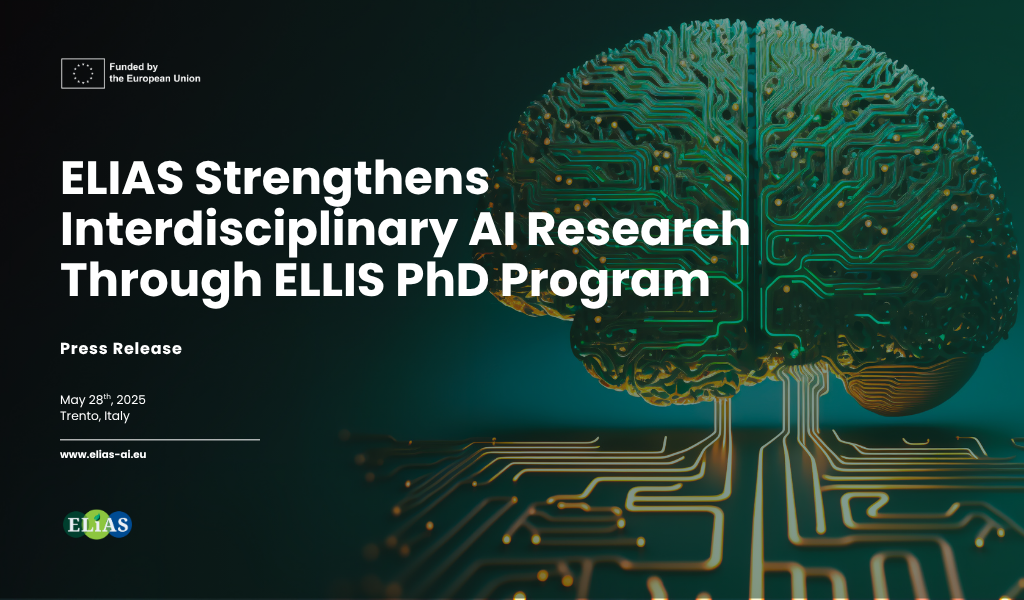
Press Release: ELIAS Strengthens Interdisciplinary AI Research Through ELLIS PhD Program
The European Lighthouse of AI for Sustainability (ELIAS) is shaping the next generation of AI researchers—through the ELLIS PhD Program—by uniting cutting-edge technical training with ethical responsibility and a focus on sustainable impact.
Trento, Italy – May 27, 2025
ELIAS is reinforcing its commitment to developing responsible and impactful AI by supporting the Interdisciplinary Track within the ELLIS PhD & Postdoc Program, now marking its first full year.
This pioneering track connects AI experts and researchers whose primary expertise lies outside of machine learning, such as biology, law, climate science, and humanities, fostering collaboration through a unique dual-supervision model that blends technical excellence with societal relevance.
“Through this track, ELIAS is helping nurture AI researchers who not only understand the algorithms, but also the broader systems they influence—equipping them to engage deeply with disciplines such as biology, law, climate science, and the humanities. By fostering interdisciplinary collaboration and dual supervision, the program ensures that technical innovation goes hand in hand with societal insight and responsibility.” said [Nicu Sebe, ELIAS Coordinator].
Reflecting the need for context-aware, inclusive and sustainability-driven research, the track pairs PhD students with supervisors in both AI and a complementary discipline. The 2023–2024 cohort is already delivering high-impact work in areas like synthetic biology and Earth system science — showcasing the program’s transformative potential.
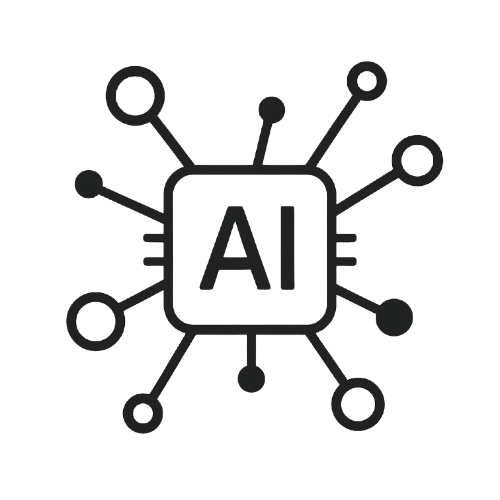
Researcher: Kieran Didi – University of Oxford
Kieran’s research explores the transformative potential of generative modelling techniques — such as diffusion models and flow matching — for biomolecular design in synthetic biology. While these methods have revolutionised image generation, their scientific use in fields like drug discovery and protein engineering is still limited by low success rates and controllability.
“This project aims to develop next-generation generative models that are not only powerful in theory but also effective in practice. The goal is to identify the most efficient way to computationally model and design biomolecules so they reliably meet experimental constraints once synthesised in the lab. Key challenges include incorporating fitness measurements into design, modelling complex experimental environments like multi-state density conditions, and leveraging atomistic modelling for greater structural control.”

Researcher: Sebastian Hoffmann – Max Planck Institute for Biogeochemistry
Sebastian’s research sets out to create WeGen-Land, the first Foundation Model for the Earth’s land surface — a breakthrough for geoscientific AI. Building on the success of Deep Learning Weather Prediction (DLWP) models, which have rapidly outperformed traditional numerical approaches, this project applies data-driven, task-independent techniques to a domain that has seen little comparable innovation.
“WeGen-Land will be trained on petabytes of satellite data using masked autoencoders to extract meaningful representations of the land surface. It will be combined with WeGen-Atmo — ECMWF’s atmospheric Foundation Model — to create WeatherGenerator, the first Earth system Foundation Model based entirely on raw observational data. The research integrates diverse satellite data into a unified model, couples land and atmosphere, and ensures scalability across space and time to support applications like carbon cycle and vegetation forecasting.”
Through their research, Kieran and Sebastian are bridging cutting-edge AI and scientific discovery — from biomolecular design to Earth system modelling — by harnessing advances in machine learning architecture and representation learning.
The Interdisciplinary Track complements the ELLIS Academic and Industry Tracks. The Academic Track includes cross-border supervision and research exchange, while the Industry Track blends academic and industrial mentorship with a six-month placement. Together, they reflect ELLIS’ mission to foster collaborative, impactful, and ethically grounded AI — a mission further amplified by ELIAS, which helps ensure Europe’s leadership in sustainable, responsible AI.
Expanding Reach Across Europe and Beyond
The ELLIS PhD & Postdoc Program now spans over 50 leading institutions across Europe, including key ELIAS partners such as the University of Copenhagen, University of Tübingen, Czech Technical University, ANITI, University of Trento, Università degli Studi di Milano, ELLIS Alicante, Fondazione Bruno Kessler, the Max Planck Institute of Biochemistry, IDEAS NCBR, Istituto Italiano di Tecnologia, ETH Zurich, Inria, Aalto University, and the University of Manchester. International collaboration is further strengthened through partnerships like CIFAR/ELLIS, with a select number of students hosted at top institutions in Canada.
The 2024 call saw 1,479 applicants from 96 countries and 102 nationalities, with nearly 3,200 applicants registered in total. Among 90 selected candidates, the most represented nationalities of the selected applicants were Europeans (51%), Chinese (13%), Indian (8%), Iranian (8%) and Israeli (3.5%) — reflecting the program’s strong global appeal and commitment to inclusivity.
610 applicants (41%) indicated research interests (RI) associated with ELIAS and sustainability.
Of the 90 selected candidates, 29% identify as female.
Of the 90 selected applicants, 38% will be joining institution within the ELIAS Consortium.
“We’re very pleased to welcome such a diverse group of students and hope they will consider joining the Interdisciplinary Track for cross-domain collaborations.” said [Charlotte Delage, ELIAS Scientific Coordinator at IP Paris & ELLIS PhD Program Coordinator].
Current data for the overall PhD program (pending final confirmation from the newest cohort) indicate the following track distribution: 73% in the Academic Track, 16% in Industry, and 1% in Interdisciplinary, with 22% of our students identifying as female.
A Single Entry Point for Global Talent
Each autumn, prospective students can apply centrally to the ELLIS PhD & Postdoc Program through a unified platform, offering access to a wide network of leading AI labs across Europe. The next call for the 2025-2026 intake will open in October, stay tuned for more information here or on the ELLIS website: https://ellis.eu/news.
In addition to the annual call, faculty members can nominate exceptional candidates year-round: https://ellis.eu/nomination-phd-postdoc.
🌟 Looking Ahead: EDS 2025
ELIAS will be one of the supporters of the upcoming edition of European Doctoral Symposium (EDS), spotlighting interdisciplinary AI research with panels, workshops, and mentoring sessions. The event will feature strong representation from the ELIAS Network among its speakers. More information can be found here: EDS 2025 – Robust AI, EDS 2025
Access Press Release here: ELIAS Strengthens Interdisciplinary AI Research Through ELLIS PhD Program